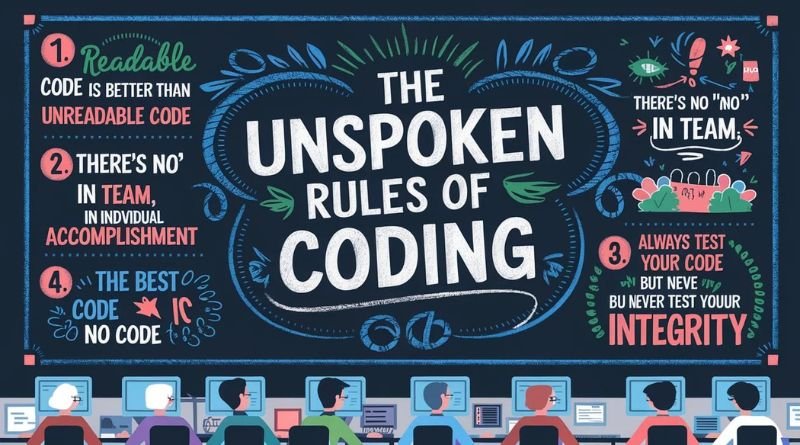Coding is not just about writing lines of code that work—it’s about writing code that is clean, efficient, and maintainable. Whether you are a novice who has just started learning how to code or a sage developer with years of experience, there are some unspoken rules in the coding world that can help you become a better programmer. These unwritten guidelines go beyond technical knowledge and offer a framework for writing code that is more than just functional. They are crucial for fostering better communication, collaboration, and long-term success in the coding world.
Table of Contents
1. Write for Others, Not Just Yourself
One of the most important principles of good coding is ensuring that your code is readable and understandable by others. While it may be tempting to write code quickly to meet deadlines or solve a problem, it’s essential to remember that other developers may need to interact with your code. The ability to read and understand code written by others is just as important as writing code that works.
Why it matters: Code that is easy to read and understand reduces errors and confusion. When collaborating with others, it’s important to write code that is clear and maintainable.
Tip: Always aim for clarity. Use meaningful variable names, keep functions short and focused, and avoid unnecessary complexity. If your code isn’t easy to understand, it’s not good code.
2. Don’t Overcomplicate Things
It can be tempting to create complex solutions, especially when solving a difficult problem. However, overcomplicating your solution will often lead to bugs, poor performance, and difficulty in maintaining the code. Novice developers may fall into the trap of trying to build too elaborate or complex solutions. On the other hand, experienced developers should strive for simplicity, understanding that simple solutions are often the best.
Why it matters: Keeping your code simple allows for easier debugging, faster performance, and easier collaboration with others. It’s easier to understand and modify simple code than to work with complex, convoluted logic.
Tip: Follow the KISS principle—”Keep It Simple, Stupid.” Aim to solve problems in the most straightforward and efficient way possible.
3. Always Test Your Code
Testing is an essential practice that all developers, novice or sage, should embrace. Writing tests might seem tedious, but they ensure that your code functions as expected and can prevent errors before they reach production.
Why it matters: Tests help to ensure that your code works under different conditions and prevents future bugs. Without tests, changes to code can introduce unintended side effects.
Tip: Write unit tests, integration tests, and use test-driven development (TDD) if possible. Automated testing can save you time and effort, particularly in larger projects.
4. Comment Wisely
While it’s important to comment your code, over-commenting or under-commenting can both be detrimental. Novices may feel the need to comment on every line of their code, while more experienced developers may sometimes leave no comments at all. It’s important to strike a balance.
Why it matters: Comments help others (and your future self) understand the intent behind your code, but excessive comments can clutter your code. On the other hand, a lack of comments can leave others confused about your logic.
Tip: Only comment where necessary, especially to explain why a specific approach is used. Comments should never be used to explain what the code does—good code should speak for itself.
5. Refactor Regularly
As you write code, you may notice areas that can be improved—whether that’s in terms of performance, readability, or efficiency. Don’t be afraid to refactor your code regularly. Refactoring helps ensure your codebase remains clean and adaptable as it evolves.
Why it matters: Refactoring improves code quality by removing unnecessary complexity and optimizing logic. It’s easier to maintain and build on a clean codebase than to work with a messy one.
Tip: Refactor regularly, especially when adding new features or after discovering bugs. Aim to improve your code without changing its functionality.
6. Follow Coding Standards and Best Practices
Coding standards and best practices are the backbone of collaborative development. These guidelines may vary between different teams and programming languages, but they all ensure consistency and promote quality in the codebase.
Why it matters: Consistent coding practices make it easier to work with other developers, reducing confusion and errors. They also help ensure that your code is efficient and maintainable.
Tip: Familiarize yourself with the coding standards for the language you are using. Follow conventions for naming variables, formatting, and structuring your code to ensure consistency.
7. Keep Learning and Stay Updated
The world of coding is constantly evolving. New languages, tools, and frameworks are developed all the time, and staying up-to-date with the latest trends can make you a better and more versatile developer. Both novice and experienced developers should never stop learning.
Why it matters: Staying current ensures that you are using the most efficient and modern tools available, which can improve the quality of your work and help you solve problems more effectively.
Tip: Attend workshops, read blogs, contribute to open-source projects, and take courses to stay updated. Make a habit of learning new things to sharpen your skills.
8. Don’t Be Afraid to Ask for Help
While coding often feels like a solitary activity, it doesn’t have to be. One of the best ways to grow as a developer is to ask for help when you need it. Novice developers may hesitate to ask questions, fearing they will appear inexperienced. However, even seasoned developers encounter problems that they can’t solve on their own.
Why it matters: Asking for help ensures that you get the correct solution more quickly, and it’s also an opportunity for learning. Every developer, no matter how experienced, encounters obstacles that require collaboration.
Tip: Reach out to mentors, colleagues, or online developer communities when you need assistance. Pair programming and team collaborations are powerful tools for improving your skills.
9. Avoid Hardcoding
Hardcoding values into your code is a common mistake made by novice developers. It may seem like a quick solution, but hardcoding values reduces the flexibility and maintainability of your code.
Why it matters: Hardcoding makes it difficult to make changes later and can introduce bugs when the hardcoded values no longer apply. Using variables and configurations instead allows for easier updates and scalability.
Tip: Always aim to use configuration files or environmental variables for values that might change over time. This keeps your code flexible and adaptable.
10. Document Your Code
Proper documentation is essential for ensuring that others can understand and use your code. It’s particularly important when working on larger projects or when the code will be handed off to other developers.
Why it matters: Good documentation helps other developers understand your code’s purpose, logic, and how to interact with it. It can also serve as a valuable reference for the future.
Tip: Provide clear documentation, including installation instructions, API documentation, and code explanations. Use documentation tools like Javadoc or Sphinx for automated documentation.
Frequently Asked Questions (FAQ)
1. What’s the best way to make my code more readable?
The best way to improve readability is to use meaningful variable and function names, write small functions with a single responsibility, and structure your code logically. Avoid long blocks of code and refactor regularly.
2. Should I always write tests for my code?
Yes, writing tests is crucial to ensure that your code behaves as expected. Unit tests, integration tests, and other types of tests help prevent bugs and ensure that future changes don’t break existing functionality.
3. How can I stay updated with the latest coding practices?
Follow coding blogs, attend conferences, participate in coding communities, and keep learning new tools and technologies. Joining open-source projects or taking courses is also a great way to stay up-to-date.
4. What’s the best way to collaborate with other developers?
Collaboration is made easier by following coding standards, using version control systems like Git, and participating in code reviews. Always communicate clearly, and don’t hesitate to ask for help when needed.
5. Why is it important to avoid hardcoding values?
Hardcoding values limits the flexibility of your code. If you need to change a value later, you’ll have to modify the code itself, which increases the risk of introducing bugs. Using variables or configuration files makes your code more flexible and maintainable.
Conclusion
The unspoken rules of coding are often the key to becoming a proficient, efficient, and collaborative developer. While learning to code is a technical skill, developing the right habits, mindset, and approach to coding is just as important. Whether you are a novice developer just starting out or a seasoned pro, embracing these unspoken rules will help you write better code and become a more effective part of the coding community.





